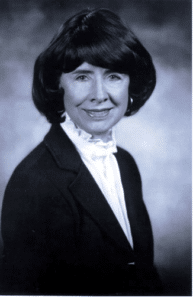 Let the blooming begin!
Let the blooming begin!
(Photo Credit: Erica Hallock)
Trivia!
The Senate Capital Budget contains funding to restore skylights in the Legislative Building that were part of the original building design. What year were the skylights removed and what were two reasons for their removal?
State Supreme Court Upholds Capital Gains Tax
On March 24, the state Supreme Court issued its long-awaited ruling on the capital gains tax, declaring that the tax is constitutional. Capital gains constitute profits made by individuals from the sales of stocks, bonds and other capital assets (with most real estate holdings exempt). The tax rate is 7%, which will be applied to capital gains profits exceeding $250,000. It is slated to fund several early learning and child care programs.
When the tax passed in 2021, Washington became the 42nd state to enact this tax estimated to impact 0.2% of Washingtonians. The tax was challenged in court on the basis that it is considered “income,” which, per a 1933 State Supreme Court ruling, would violate the state constitution’s provisions against state income taxes. In its 7-2 ruling, the state Supreme Court found capital gains to be an excise tax related to the sale of the assets and not on the assets themselves. In other words, it is not an income tax and therefore is constitutional.
Check out the Washington Department of Revenue and this Crosscut article for more information about the capital gains tax and the Court’s ruling.
Budget Proposals Released
The budget process continues to move forward with budget writers and staff devoting many sleepless nights to running cost models, drafting amendments and doing their best to ensure all the numbers add up.
This week, the House of Representatives released its proposed 2023-25 Operating, Capital and Transportation budgets. The Washington State Financial Information website contains updated links to budget bills and summaries.
The budgets are massive and complex. I like to equate them to an onion as they have many layers and can make you cry. Start Early Washington updated our budget comparison document on our resource page to reflect the status as of March 30, including the House proposals. Note, this is an evolving process, and we will do our best to keep the resource document updated.
As of this writing, the Senate passed its operating budget on a 40-9 vote and its capital budget on a 44-0 vote with 5 Senators excused. In the very early morning hours on March 30, the House Appropriations Committee voted out its proposed budget after considering scores of amendments. Next, the full House of Representatives will consider the House budget. Then, budget writers will work to resolve differences in approaches prior to April 23 Sine Die (adjournment).
Legislative Updates
House Committee holds Early Achievers work session. The House Human Services, Youth, and Early Learning Committee held a work session on Early Achievers (EA) March 28, which can be seen on TVW at the 35 minute mark. Early Achievers is the state’s early learning quality system for ECEAP and child care programs and is funded by state and federal dollars. Committee materials provide a solid overview of the program and its impacts.
Nicole Rose, Assistant Secretary Early Learning at the Department of Children, Youth and Families (DCYF) presented on behalf of DCYF and provided an overview of related state and federal policies, funding mechanisms and the functions of the system, including the Quality Rating and Improvement System (QRIS) and professional development. Assistant Secretary Rose also provided an overview of the child care and ECEAP workforce and education requirements.
Early learning bills continue to make progress. A number of early learning bills continued to move through the legislative process after the March 29 policy committee cutoff, when all bills had to be passed out of policy committees in the opposite chamber. Fiscal committee cutoff is rapidly approaching on April 4. Both the Senate Ways and Means and House Appropriations Committees are scheduled for marathon public hearings and executive sessions (votes) to meet this deadline. This is a very fluid time in the process, with bills coming on and off committee schedules and rumors tend to fly! It is important to remember that no concept is truly “dead” until Sine Die.
After the fiscal committee cutoff, legislators will go back to voting bills off the floor, reconciling differences between House and Senate versions of bills and sending them to the Governor for consideration.
Bill updates as of March 30:
House Bill 1199, which prohibits “common interest communities” such as a homeowners association from banning or limiting a licensed child care center or family home, is waiting to be pulled from the Senate Rules Committee to the Senate floor. If the bill passes with no amendments on the Senate floor, it will head straight to Governor Inslee for signature.
House Bill 1525, which provides qualifying applicants and consumers of state registered apprenticeship programs eligibility for child care subsidies, had a public hearing and awaits a vote in the Senate Ways & Means Committee.
Senate Bill 5225, which increases access to child care by providing subsidy eligibility to families involved in therapeutic court, bans immigration status discrimination for child care subsidies and authorizes child care subsidy eligibility for dependents of child care employees, has a hearing in the House Appropriations Committee Saturday, April 1.
Senate Bill 5252, which updates state regulations regarding background checks to meet federal regulations, passed the House Human Services, Youth, and Early Learning Committee and is headed to the House Rules Committee, where it awaits placement on the floor calendar.
Senate Bill 5316, which eliminates the requirement for applicants of child care and foster care entities to pay state and federal background check fees and licensing fees, awaits a hearing date and a vote in the House Appropriations Committee.
Senate Bill 5580, which authorizes a post-delivery and transitional care program and updates the Maternity Support Services (MSS) program, was voted out of the House Health Care & Wellness Committee with an amendment that adjusts the timelines for increasing the income eligibility thresholds for pregnant and postpartum Apple Health coverage to both go into effect Nov. 1, 2023. SB 5580 will need a hearing and a vote in the House Appropriations Committee by April 4.
Finally, a new striking amendment (or striker) for Second Substitute House Bill 1550 (2SHB 1550), which converts the Transitional Kindergarten (TK) program to a Transition to Kindergarten (TTK) program, was passed out of the Senate Early Learning and K12 Committee on March 27 and can be seen on TVW starting at the 3:30 minute mark.
A striker replaces all previous content with a new bill on the same subject matter. The 2SHB 1550 striker had modifications presented during the March 27 executive session that were different from the version that received a hearing on March 22. The new striker that passed committee would:
- Change the name “Transitional Kindergarten” to “Transition to Kindergarten” (TTK), place the program in statute (law), and clarify that TTK is not a K12 basic education program.
- Require the Office of Superintendent of Public Instruction (OSPI) to administer and adopt rules as well as a state site visit process for TTK. Initial rules would need to be adopted in time for the 2023-24 school year and permanent rules would need to be adopted by the beginning of the 2024-25 school year.
- Create TTK eligibility for children determined to benefit from an additional year of preparation before entry into kindergarten, and children must be at least 4-years-old by Aug. 31 in the year of entry into the program. The striker would ban discrimination against students with disabilities, bar tuition and provide school districts with the option to prioritize children from lowest-income families and those needing additional preparation prior to kindergarten entry.
- Require enrolled TTK students to receive a student identifier number for data tracking and require districts to administer WaKIDS twice a year unless parents ask for an exemption.
- Require participating school districts to conduct a local child care and early learning needs assessment before starting or expanding TTK. This assessment would need to consider existing availability and affordability of other early learning programs in the service area.
- Require OSPI and DCYF to develop statewide coordinated eligibility, recruitment, enrollment and selection best practices and adds a requirement that school districts and public schools adhere to OSPI guidelines related to TTK. The bill also directs DCYF to make administrative changes to better align ECEAP implementation with state-funded early learning programs serving 3 through 5-year-old children offered by school districts and requires a report by July 1, 2024.
- Provide a funding formula for the program based on the reported full-time equivalent of eligible children in the program and calculated under certain portions of the prototypical school funding model. The striker also directs the Caseload Forecast Council to forecast eligible children participating in TTK at regular intervals for state budgetary purposes.
- Clarify that school districts and OSPI cannot develop a state-funded program specifically for children that do meet standard K12 entry requirements without legislative approval.
HB 1550 is scheduled for a public hearing in the Senate Ways & Means Committee March 31.
Bill Tracker: Key Early Learning Bills
As the legislative session progresses, our resource page will update with a weekly bill tracker. Please note that legislation changes quickly, so the version on our website may not represent a bill’s latest version as it is published the Thursday of each week.


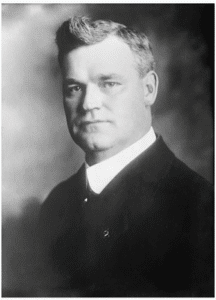
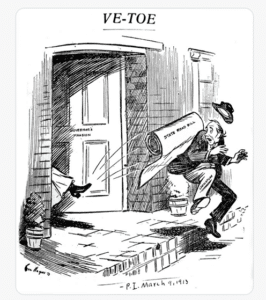
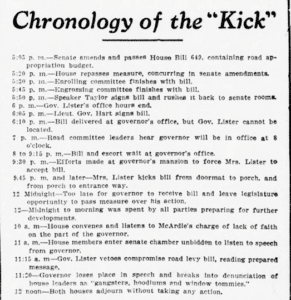
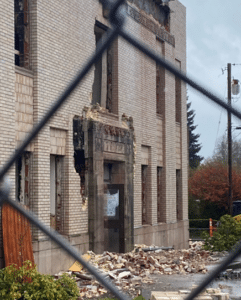
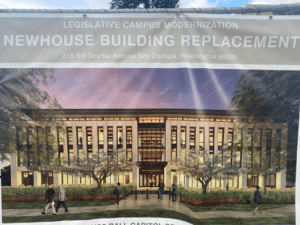
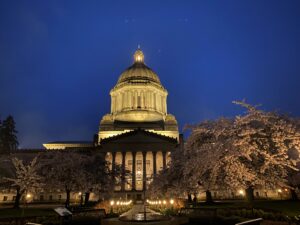


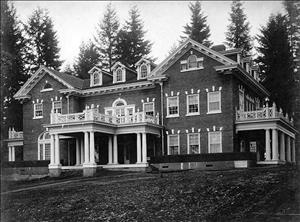 Washington State Governor’s Mansion
Washington State Governor’s Mansion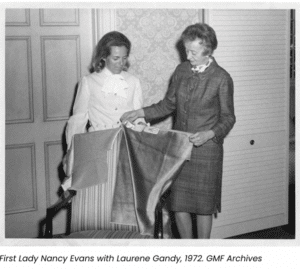 (Photo Credit:
(Photo Credit: 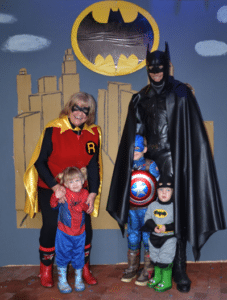 Governor “Batman” Inslee and First Lady “Robin” Inslee pose with some of their super-hero grandchildren
Governor “Batman” Inslee and First Lady “Robin” Inslee pose with some of their super-hero grandchildren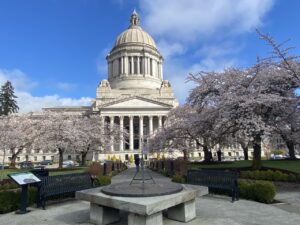
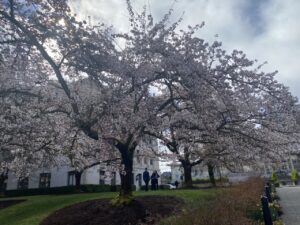
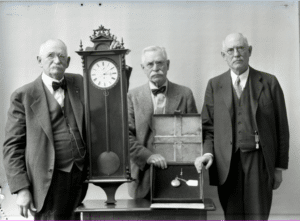 The Talcott Brothers – Charles, Grant, and George circa 1960
The Talcott Brothers – Charles, Grant, and George circa 1960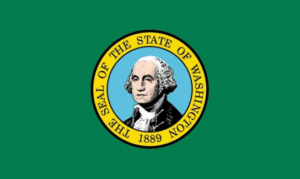 Current Washington State Flag
Current Washington State Flag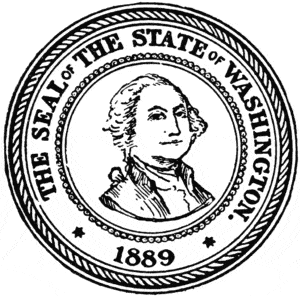 Original State Seal, 1889
Original State Seal, 1889
 Let the blooming begin!
Let the blooming begin! East and west skylights visible during Legislative Building construction in 1925
East and west skylights visible during Legislative Building construction in 1925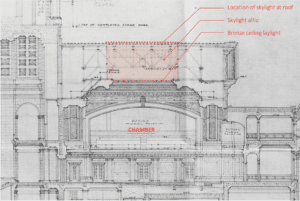 Original Legislative Building architectural designs
Original Legislative Building architectural designs Rendering of proposed restoration site for skylights
Rendering of proposed restoration site for skylights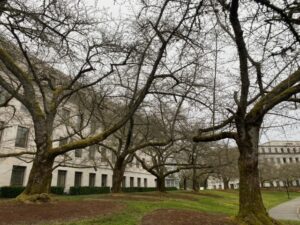 Trees anxiously awaiting the arrival of the Cherry Blossoms
Trees anxiously awaiting the arrival of the Cherry Blossoms